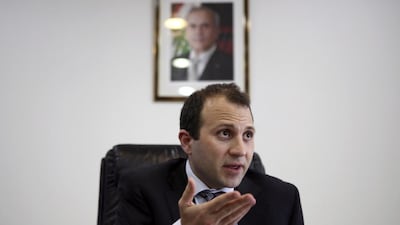This is a crucial week for the Lebanese government, as it begins discussions on the 2019 budget. Lebanon is facing a severe economic crisis, with a national debt equivalent to around 150 per cent of GDP. Approval of an austerity budget will be a key measure, allowing countries that pledged last year to help Lebanon to determine whether the government is serious about economic reform.
However, if relations among leading members of the country’s political class are any indicator, there is no broad consensus on what must be done to save Lebanon from financial bankruptcy, with its subsequent impact on the value of the national currency, the Lebanese pound. In fact, what we see today are politicians who remain divided, are wedded to the costly practice of political clientelism, and who continue to pursue political agendas at the expense of the public good.
A sign that not all is well is that the country's political forces are already preparing the groundwork for highly unpopular economic measures, and trying to portray themselves as innocent of any wrongdoing. An example of this occurred recently when the foreign minister, Gebran Bassil, launched a trial balloon, saying that the government might cut the salaries of public-sector employees. In 2017, the government had raised these salaries, against the advice of economists who said Lebanon could not afford to do so.
The reaction to Mr Bassil's statement was condemnation, and the government backtracked. While this was understandable, in light of the widespread corruption throughout the state, it also showed that politicians are reluctant to impose austerity on their own supporters. State employment is a sphere of political patronage, and it will be difficult to make deep spending cuts affecting this.
Such an inability will be particularly relevant for the electricity sector, the black hole of the economy. At an international donors’ conference held last year in Paris to help Lebanon overcome its financial problems, the sector was identified as a major drain, with an annual deficit of between $1.5 billion and $2 billion.
As a prelude to discussion of the budget, the government passed a new electricity plan earlier this month. The state intends to provide around-the-clock electricity by next year and to build six new power plants. World Bank employees sat in on government discussions of the plan, showing that Lebanon remains under some sort of international oversight while addressing its difficulties.
What happens in the electricity sector will be a sign of the intentions of the political class. The sector has been filled with superfluous employees for patronage reasons, and they will be difficult to remove from their posts. More worrisome is that many politicians benefit financially from its dysfunctional nature. Some profit from Turkish power-generating ships that make up for the deficit in electricity production, others take money from networks of neighbourhood generators, while others gain from the sale of oil to run them.
This represents a perfect storm of corruption and rent, at a time when the political class is being starved of outside funds. Political money from countries in the region that once allowed them to finance their patronage networks has dried up. This represents an additional obstacle to reform, since true reform measures would effectively undercut the politicians’ domestic sources of finance.
Contributing to the absence of a consensus are the agendas of certain political actors. It is no secret that Mr Bassil would like to succeed his father-in-law, Michel Aoun, as president. Yet there are politicians who strongly oppose him, including parliament speaker Nabih Berri, the Druze leader Walid Jumblatt, and the head of the Lebanese Forces party Samir Geagea. As their disputes play out, there is a justifiable fear that they will hinder serious change.
For instance, Mr Geagea’s antagonism towards Mr Bassil helped feed the Lebanese Forces’ opposition to the initial version of the electricity plan. The electricity minister was appointed by Mr Bassil, and her plan was seen as benefiting his interests. Not long after, the finance minister, a Berri appointee, accused Mr Bassil of engaging in widespread corruption.
This may be par for the course in a politically divided Lebanon, but its economic impact cannot be underestimated. Amid widespread public contempt for politicians and their evident corruption, it will be that much harder for the government to adopt reforms that increase the pressure on a majority of Lebanese. What is more likely to happen is that economic reform will remain a political football between the politicians, only increasing discontent.
Amid statements from all sides that the poor must not bear the burden of austerity, what is likely to emerge is a compromise that mainly affects the middle class. While little has leaked from the draft budget, there has been talk that taxes will be raised. As the wealthy in Lebanon have the means to evade taxes, it is the middle class that will likely face the brunt of new policies.
This will bring us back to the old question of whether austerity, by rendering more vulnerable the most economically active groups in society, is really the optimal solution. Lebanon’s true problem is disastrous governance, and asking its politicians to introduce reform is like asking wolves to care for sheep.
Michael Young is editor of Diwan, the blog of the Carnegie Middle East programme, in Beirut


